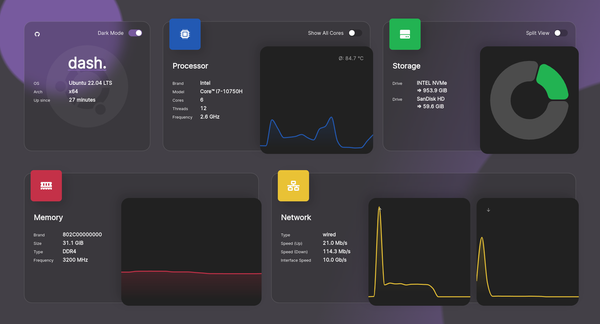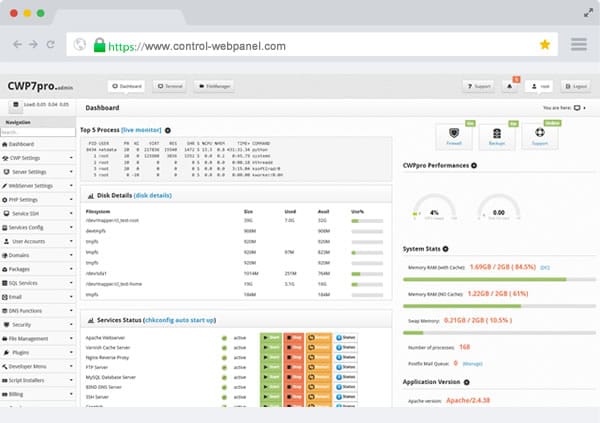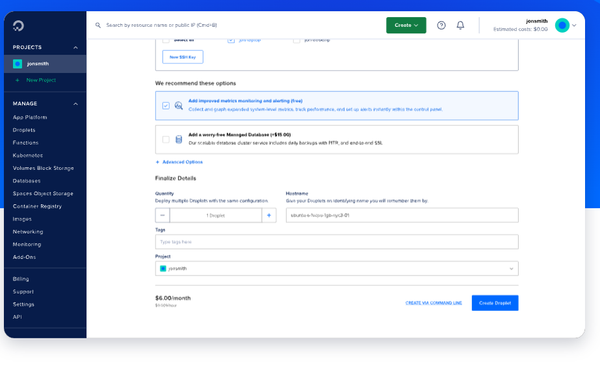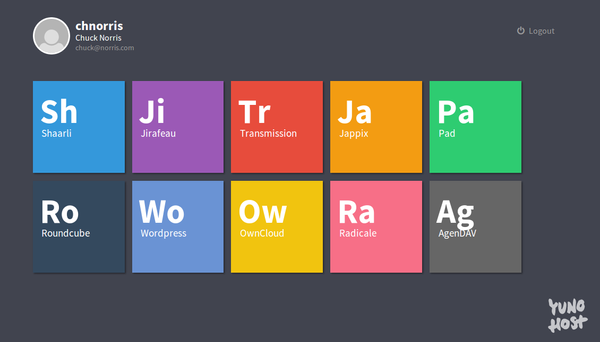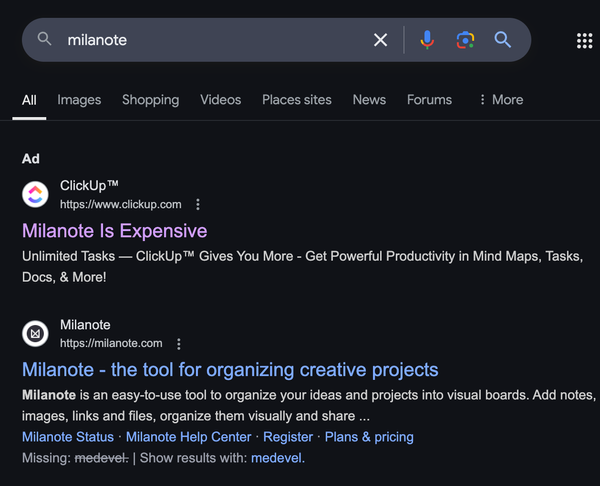Top 7 Cloud Hosting Providers: A Guide to Pricing, Pros & Cons for, Agencies,Freelancers, Startups and Healthcare
Table of Content
When considering cloud services, AWS and IBM Cloud are popular, but there are alternatives that may better fit specific needs like cost or industry requirements.
Here’s a look at seven cloud providers, comparing pricing, pros, and cons, with a focus on their suitability for healthcare projects. We also cover the best options for freelancers and web agencies.
1. AWS (Amazon Web Services)
AWS (Amazon Web Services) is a comprehensive cloud service provider that offers a wide range of cloud-based products and services to individuals, businesses, and governments. Launched in 2006 by Amazon, AWS is one of the largest and most widely used cloud platforms globally.
AWS's broad range of services and global presence make it a go-to cloud provider for a variety of use cases, including web hosting, big data processing, machine learning, and enterprise applications.
Key Features of AWS:
- Compute Power: AWS provides various computing resources, including Amazon EC2 (Elastic Compute Cloud), which offers scalable virtual servers, and AWS Lambda for serverless computing.
- Storage Solutions: AWS offers numerous storage options such as Amazon S3 (Simple Storage Service) for object storage, Amazon EBS (Elastic Block Store) for block storage, and Amazon Glacier for long-term archival storage.
- Database Services: AWS provides managed database services including Amazon RDS (Relational Database Service) for SQL databases, Amazon DynamoDB for NoSQL databases, and Amazon Redshift for data warehousing.
- Networking: AWS offers networking services like Amazon VPC (Virtual Private Cloud) to create isolated networks, AWS Direct Connect for private connectivity to AWS, and Route 53 for domain name system (DNS) management.
- Security and Identity: AWS provides a suite of security services including AWS Identity and Access Management (IAM) for access control, AWS Shield for DDoS protection, and AWS Key Management Service (KMS) for encryption key management.
- Machine Learning and AI: AWS has a range of AI and machine learning services, including Amazon SageMaker for building, training, and deploying ML models, and AWS Rekognition for image and video analysis.
- Developer Tools: AWS offers tools for developers to build, test, and deploy applications, including AWS CodeCommit (source control), AWS CodePipeline (continuous integration and delivery), and AWS Cloud9 (IDE).
- Analytics: AWS provides analytics services like Amazon Kinesis for real-time data streaming, Amazon EMR (Elastic MapReduce) for big data processing, and AWS Glue for data cataloging and ETL (extract, transform, load).
Why AWS is Popular:
- Scalability: AWS allows users to easily scale resources up or down based on demand, making it suitable for both startups and large enterprises.
- Global Reach: AWS has data centers across multiple regions worldwide, allowing users to deploy applications close to their customers.
- Reliability: AWS is known for its high availability and reliability, offering multiple redundancy and failover options.
- Cost-Efficiency: With a pay-as-you-go pricing model, AWS enables users to pay only for what they use, helping manage costs effectively.
- Wide Range of Services: AWS provides an extensive suite of cloud services, covering almost every aspect of cloud computing, making it a one-stop solution for many businesses.
Pricing
- Compute (t4g.micro): $0.0042/hour
- Storage (S3 Standard): $0.023/GB/month
- Bandwidth: $0.09/GB after 1GB free
Pros:
- Wide Range of Services: Extensive tools and services.
- Global Reach: Over 25 regions worldwide.
- Strong Security: Highly secure with numerous compliance certifications.
Cons:
- Complex Pricing: Difficult to predict costs due to complex pricing models.
- Support Costs: Premium support is expensive.
2. IBM Cloud
IBM Cloud is a comprehensive suite of cloud computing services offered by IBM, designed to meet the needs of enterprises, developers, and startups. IBM Cloud provides both infrastructure as a service (IaaS) and platform as a service (PaaS), offering a wide range of tools and services for building, deploying, and managing applications in the cloud.
IBM Cloud is especially well-suited for enterprises looking for a hybrid cloud solution with a strong emphasis on security, AI capabilities, and support for legacy systems. It provides a versatile platform for businesses of all sizes, enabling them to build, deploy, and manage applications across a wide range of environments.
Key Features of IBM Cloud:
- Compute Options: IBM Cloud provides various compute options, including Virtual Servers, Bare Metal Servers for dedicated performance, and Kubernetes Service for container orchestration and management.
- Storage Solutions: IBM Cloud offers multiple storage services, such as IBM Cloud Object Storage for scalable and secure object storage, Block Storage for high-performance storage, and File Storage for shared file access.
- Database Services: IBM Cloud offers managed database services like IBM Db2 for SQL databases, Cloudant for NoSQL databases, and IBM Informix for high-performance data management.
- Networking: IBM Cloud provides networking services such as Virtual Private Cloud (VPC) for isolated network environments, Direct Link for private network connectivity, and Load Balancer for distributing traffic across servers.
- AI and Machine Learning: IBM Cloud is known for its AI and machine learning capabilities, particularly with Watson, IBM's AI platform. Watson offers services like Natural Language Understanding, Watson Studio for building and training models, and Watson Assistant for creating chatbots.
- Security and Compliance: IBM Cloud emphasizes security and compliance, offering services like Identity and Access Management (IAM), IBM Key Protect for encryption key management, and Cloud Security Advisor for monitoring security posture.
- Developer Tools: IBM Cloud provides tools for developers, including IBM Cloud Continuous Delivery for CI/CD pipelines, IBM Cloud Functions for serverless computing, and IBM Cloud Shell for a web-based command-line interface.
- Hybrid Cloud Solutions: IBM Cloud is a leader in hybrid cloud environments, offering solutions like IBM Cloud Satellite for managing cloud services across on-premises, edge, and public cloud environments.
- Analytics and Big Data: IBM Cloud offers analytics services like IBM Cloud Pak for Data for integrating data across multiple sources, Apache Spark for big data processing, and IBM Watson Analytics for AI-driven data insights.
Why IBM Cloud is Popular:
- Hybrid Cloud Capabilities: IBM Cloud is known for its strong support for hybrid cloud environments, allowing businesses to integrate on-premises infrastructure with public and private cloud services seamlessly.
- Enterprise-Grade Security: IBM Cloud places a strong emphasis on security and compliance, making it a popular choice for industries with stringent regulatory requirements, such as healthcare and finance.
- AI and Machine Learning Expertise: With Watson, IBM Cloud provides robust AI and machine learning tools, catering to organizations looking to leverage AI in their applications.
- Global Presence: IBM Cloud has data centers in multiple regions around the world, enabling customers to deploy their applications close to their end-users and meet data residency requirements.
- Support for Legacy Systems: IBM Cloud offers tools and services that support legacy applications, making it easier for businesses to migrate to the cloud without needing to re-architect their applications entirely.
Pricing
- Compute (VSI bx2-2x8): $0.05/hour
- Storage (Standard): $0.02/GB/month
- Bandwidth: 250GB free per month, $0.09/GB thereafter
Pros:
- AI & Analytics: Advanced AI and data analytics tools.
- Security & Compliance: Strong focus on data security and industry compliance.
- Hybrid Cloud Solutions: Excellent support for hybrid cloud deployments.
Cons:
- Fewer Data Centers: Limited global presence compared to AWS and Azure.
- Complex Interface: The platform can be difficult to navigate.
3. Microsoft Azure
Microsoft Azure is a comprehensive cloud computing service created by Microsoft, providing a wide array of cloud services for building, deploying, and managing applications through Microsoft-managed data centers. Azure supports various platforms and languages, making it a popular choice for enterprises, startups, and developers. Azure is one of the leading cloud service providers globally, known for its deep integration with Microsoft products and services.
Microsoft Azure is a versatile cloud platform that caters to a broad range of use cases, from web hosting and application development to machine learning and data analytics. Its integration with the Microsoft ecosystem, robust hybrid cloud capabilities, and strong security features make it a popular choice for enterprises, developers, and organizations across various industries.
Key Features of Microsoft Azure:
- Compute Services: Azure offers a variety of compute services, including Virtual Machines (VMs) for scalable cloud computing, Azure Functions for serverless computing, and Azure Kubernetes Service (AKS) for orchestrating and managing containers.
- Storage Solutions: Azure provides multiple storage options such as Azure Blob Storage for unstructured data, Azure Files for managed file shares, Azure Disk Storage for high-performance block storage, and Azure Archive Storage for cost-effective archival solutions.
- Database Services: Azure offers managed database services like Azure SQL Database for relational data, Azure Cosmos DB for globally distributed NoSQL databases, Azure Database for MySQL and PostgreSQL, and Azure Data Lake for big data analytics.
- Networking: Azure's networking services include Azure Virtual Network for creating isolated networks, Azure ExpressRoute for private connections to Azure, Azure Load Balancer for distributing traffic across services, and Azure Front Door for global HTTP load balancing.
- Artificial Intelligence and Machine Learning: Azure provides robust AI and machine learning capabilities with services like Azure Machine Learning for building and deploying ML models, Azure Cognitive Services for pre-built AI models (including language, vision, and decision services), and Azure Bot Services for creating intelligent bots.
- Security and Identity: Azure places a strong emphasis on security, offering services like Azure Active Directory for identity and access management, Azure Security Center for threat detection and management, and Azure Key Vault for securing secrets and encryption keys.
- Developer and DevOps Tools: Azure provides tools for developers and DevOps teams, including Azure DevOps for continuous integration and delivery (CI/CD), Azure DevTest Labs for rapid development and testing environments, and Azure Monitor for monitoring applications and infrastructure.
- Hybrid Cloud and Multi-Cloud Solutions: Azure offers solutions for hybrid and multi-cloud environments with services like Azure Arc for managing resources across on-premises, multi-cloud, and edge environments, and Azure Stack for running Azure services on-premises.
- Analytics and Big Data: Azure offers analytics services such as Azure Synapse Analytics for big data and data warehousing, Azure HDInsight for open-source analytics, Azure Data Factory for data integration and orchestration, and Azure Stream Analytics for real-time data processing.
Why Microsoft Azure is Popular:
- Integration with Microsoft Ecosystem: Azure is deeply integrated with Microsoft's suite of products, including Windows Server, Active Directory, Microsoft 365, and Dynamics 365, making it a natural choice for businesses already using Microsoft technologies.
- Global Reach and Scalability: Azure has a vast global network of data centers, allowing businesses to deploy applications close to their users and scale services dynamically to meet demand.
- Hybrid Cloud Capabilities: Azure offers robust hybrid cloud solutions, enabling businesses to integrate on-premises infrastructure with cloud services seamlessly, making it ideal for organizations transitioning to the cloud.
- Comprehensive Security and Compliance: Azure provides a comprehensive set of security tools and adheres to various compliance standards, making it suitable for highly regulated industries like healthcare, finance, and government.
- Support for Open Source and Third-Party Tools: Azure supports a wide range of programming languages, frameworks, and third-party tools, making it a flexible platform for developers and enterprises with diverse technology stacks.
Pricing
- Compute (B1S VM): $0.0071/hour
- Storage (Standard HDD): $0.05/GB/month
- Bandwidth: First 5GB free, $0.087/GB thereafter
Pros:
- Integration with Microsoft Products: Seamless with Office 365 and other Microsoft tools.
- Global Reach: Over 60 regions worldwide.
- Healthcare Compliance: HIPAA and HITRUST certified.
Cons:
- Complex Pricing: Difficult to estimate due to many services and options.
- Learning Curve: Challenging for non-Microsoft users.
4. Google Cloud Platform (GCP)
Google Cloud Platform (GCP) is a suite of cloud computing services provided by Google, designed for building, deploying, and scaling applications. GCP offers a wide range of services across compute, storage, databases, networking, machine learning, and more, making it a versatile platform for businesses, developers, and startups.
GCP is suitable for a variety of use cases, including data analytics, machine learning, web and mobile app development, and enterprise applications, providing a scalable and secure cloud platform.
Key Features of Google Cloud Platform (GCP):
- Compute Services: GCP offers several compute options, including Google Compute Engine for virtual machines, Google Kubernetes Engine (GKE) for container orchestration, and Cloud Functions for serverless computing.
- Storage Solutions: GCP provides storage options like Google Cloud Storage for object storage, Persistent Disks for block storage, and Filestore for managed file storage.
- Database Services: GCP includes managed databases such as Cloud SQL for relational databases, Cloud Firestore and Cloud Bigtable for NoSQL databases, and Cloud Spanner for globally distributed databases.
- Networking: GCP offers networking services including Virtual Private Cloud (VPC) for isolated network environments, Cloud Interconnect for private connectivity, and Cloud Load Balancing for distributing traffic across regions.
- Machine Learning and AI: GCP provides AI and machine learning services like Vertex AI for building and deploying ML models, AutoML for custom model training, and APIs for natural language processing, vision, and translation.
- Security and Identity: GCP emphasizes security with services like Identity and Access Management (IAM) for access control, Cloud Key Management for encryption key management, and Security Command Center for threat detection and response.
- Developer Tools: GCP offers tools for developers such as Cloud Build for CI/CD pipelines, Cloud Source Repositories for source control, and Cloud Shell for a web-based command-line interface.
- Data Analytics: GCP provides analytics services like BigQuery for data warehousing, Dataflow for stream and batch processing, and Dataproc for Apache Hadoop and Spark.
Why Google Cloud Platform (GCP) is Popular:
- Global Network Infrastructure: GCP leverages Google's global network, offering low-latency and high-speed connections across regions.
- Data and AI Capabilities: GCP is known for its advanced data analytics and machine learning services, providing powerful tools for data-driven applications.
- Security and Compliance: GCP offers robust security features and compliance with various global standards, making it a trusted platform for sensitive workloads.
- Open Source and Multicloud Support: GCP supports a wide range of open-source tools and technologies, and provides flexibility for multicloud deployments.
Pricing
- Compute (e2-micro VM): $0.0076/hour
- Storage (Standard): $0.02/GB/month
- Bandwidth: $0.12/GB after first 1GB
Pros:
- AI & ML Services: Leading AI and machine learning tools.
- Scalability: Excellent for scaling workloads.
- Security: Strong security features and HIPAA compliance.
Cons:
- Support Costs: Premium support comes at a high cost.
- Fewer Regions: Limited global reach compared to AWS and Azure.
5. Oracle Cloud Infrastructure (OCI)
Oracle Cloud Infrastructure (OCI) is a comprehensive cloud computing service offered by Oracle Corporation, designed to provide high-performance computing, storage, networking, and database services. OCI is built with a focus on enterprise needs, offering a range of cloud solutions that deliver robust performance, security, and reliability for businesses of all sizes.
Oracle Cloud Infrastructure is ideal for enterprises seeking a high-performance, secure, and scalable cloud platform, with a strong emphasis on database services and hybrid cloud capabilities. It is well-suited for a wide range of applications, from traditional enterprise workloads to modern cloud-native applications.
Key Features of Oracle Cloud Infrastructure (OCI):
- Compute Services: OCI provides various compute options, including Oracle Compute for virtual machines and bare metal servers, which offer dedicated physical server resources for high-performance workloads, and Oracle Kubernetes Engine (OKE) for container orchestration.
- Storage Solutions: OCI offers multiple storage services, such as Oracle Object Storage for scalable object storage, Block Volumes for high-performance block storage, and File Storage for shared file systems.
- Database Services: Oracle Cloud is known for its advanced database offerings, including Oracle Autonomous Database, which provides automated tuning and scaling, Oracle Exadata Cloud Service for high-performance database workloads, and Oracle MySQL Database Service.
- Networking: OCI provides a range of networking capabilities, including Virtual Cloud Network (VCN) for creating isolated networks, FastConnect for dedicated private connectivity to Oracle Cloud, and Load Balancer for distributing traffic across multiple servers.
- Security and Compliance: OCI emphasizes security with features like Identity and Access Management (IAM) for controlling access to resources, Oracle Cloud Guard for monitoring and managing security posture, and Data Safe for comprehensive database security.
- Developer and DevOps Tools: OCI offers tools for developers and DevOps teams, including Oracle Cloud Infrastructure DevOps for continuous integration and delivery (CI/CD), Resource Manager for infrastructure automation, and OCI Functions for serverless computing.
- Hybrid and Multicloud Solutions: OCI supports hybrid and multicloud environments with services like Oracle Cloud VMware Solution for running VMware workloads, and Oracle Interconnect for Azure for direct connectivity between Oracle Cloud and Microsoft Azure.
- Analytics and Big Data: OCI provides analytics services such as Oracle Big Data Service for processing large datasets, Oracle Cloud Infrastructure Data Flow for serverless Apache Spark processing, and Oracle Analytics Cloud for business intelligence and data visualization.
Why Oracle Cloud Infrastructure (OCI) is Popular:
- Enterprise-Grade Performance: OCI is designed to meet the demanding requirements of enterprise workloads, offering high performance, scalability, and reliability across its services.
- Comprehensive Database Solutions: OCI provides a robust set of database services, including the Oracle Autonomous Database, which simplifies database management with automated tuning, scaling, and patching.
- Strong Security and Compliance: OCI offers extensive security features and adheres to various global compliance standards, making it suitable for industries with stringent regulatory requirements.
- Cost-Effective Pricing: OCI provides competitive pricing models with predictable costs, appealing to businesses looking for cost-effective cloud solutions without sacrificing performance or security.
- Hybrid Cloud Capabilities: OCI supports hybrid cloud deployments, enabling businesses to seamlessly integrate on-premises infrastructure with Oracle Cloud, and providing flexibility for multi-cloud strategies.
Pricing
- Compute (Ampere A1): $0.01/hour
- Storage (Standard): $0.0255/GB/month
- Bandwidth: 10TB free per month, $0.0085/GB thereafter
Pros:
- Competitive Pricing: Affordable for compute and storage.
- Performance: Strong for database-heavy workloads.
- Healthcare Tools: Specific tools for healthcare compliance and interoperability.
Cons:
- Limited Ecosystem: Fewer third-party integrations.
- Complex Setup: Initial setup can be challenging.
6. DigitalOcean
DigitalOcean is a cloud infrastructure provider focused on simplicity, performance, and developer-friendly services. Tailored for small to medium-sized businesses, startups, and individual developers, DigitalOcean offers a range of cloud services designed to make deploying, managing, and scaling applications straightforward and efficient.
DigitalOcean is ideal for developers seeking a straightforward, cost-effective cloud platform that prioritizes ease of use, performance, and flexibility. Whether you’re building a small personal project or scaling a startup, DigitalOcean provides the tools and support needed to focus on what matters most: developing great applications.
Key Features of DigitalOcean:
- Compute Services: DigitalOcean provides a variety of compute options, including Droplets (virtual machines) for scalable computing power, Kubernetes for container orchestration, and Functions for serverless computing.
- Storage Solutions: DigitalOcean offers several storage options, such as Spaces for object storage, Volumes for scalable block storage, and DigitalOcean Database Backups for automated database backup solutions.
- Managed Databases: DigitalOcean provides managed database services for popular databases like PostgreSQL, MySQL, and Redis, offering automated maintenance, scaling, and backups to simplify database management.
- Networking: DigitalOcean’s networking services include Virtual Private Cloud (VPC) for isolated networking environments, Load Balancers for distributing traffic across servers, and Floating IPs for easy failover in high-availability setups.
- Developer Tools: DigitalOcean offers various tools and resources for developers, including the DigitalOcean API for programmatic access to all its services, CLI tools for command-line management, and pre-configured 1-Click Apps for rapid deployment of popular applications and development stacks.
- Security: DigitalOcean emphasizes security with features like Cloud Firewalls for managing inbound and outbound traffic, private networking for secure data transfer between Droplets, and integrated backups and snapshots for data protection.
- Simplicity and User Experience: DigitalOcean is known for its user-friendly interface and straightforward pricing model, making it easy for developers to deploy and manage cloud resources without needing extensive cloud expertise.
- Monitoring and Insights: DigitalOcean provides monitoring tools such as Insights for tracking resource usage and performance, Alerts for setting up notifications based on custom metrics, and Managed Monitoring for comprehensive application monitoring.
Why DigitalOcean is Recommended for Developers:
- Developer-Friendly Environment: DigitalOcean focuses on creating a simple, intuitive experience tailored to developers, enabling quick setup and deployment without the complexity often associated with other cloud platforms.
- Transparent Pricing: With a straightforward and predictable pricing model, developers can easily estimate and manage their costs, avoiding unexpected expenses and focusing on building and scaling their applications.
- Wide Range of Developer Tools: DigitalOcean provides a suite of tools designed specifically for developers, from APIs and CLI tools to pre-configured application stacks, making it easier to develop, test, and deploy applications.
- Strong Community Support: DigitalOcean has a vibrant community of developers, offering extensive tutorials, forums, and resources to help with various development and deployment scenarios.
- Rapid Scaling and Flexibility: With DigitalOcean, developers can quickly scale their infrastructure as their application grows, ensuring they have the resources needed to handle increased demand without downtime or disruption.
Pricing
- Compute (Basic Droplet): $0.007/hour
- Storage (Block Storage): $0.10/GB/month
- Bandwidth: Free up to a limit, then $0.01/GB
Pros:
- Simplicity: User-friendly interface.
- Cost-Effective: Ideal for small projects and startups.
- Fast Deployment: Quick setup for new instances.
Cons:
- Limited Services: Fewer advanced tools.
- Support: Basic support unless upgraded.
7. Linode (Akamai)
Linode (Akamai) is a cloud service provider known for its high-performance infrastructure and developer-friendly approach. Acquired by Akamai in 2022, Linode offers a range of cloud services designed to meet the needs of developers, startups, and small to medium-sized businesses. Linode emphasizes simplicity, transparency, and performance, providing a reliable platform for deploying and managing cloud applications.
Linode (Akamai) is an excellent choice for developers seeking a high-performance, cost-effective cloud platform that prioritizes ease of use, transparency, and flexibility. Whether you are launching a startup, developing a new app, or scaling an existing application, Linode provides the resources and support needed to succeed in the cloud.
Key Features of Linode (Akamai):
- Compute Services: Linode offers various compute options, including Linodes (virtual private servers) for scalable computing power, dedicated CPU instances for consistent performance, and Akamai Cloud Computing for comprehensive edge cloud services.
- Storage Solutions: Linode provides multiple storage options, such as Block Storage for scalable and high-performance storage needs, Object Storage for unstructured data, and Backups for automated data protection and recovery.
- Managed Databases: Linode offers managed database services for popular databases like MySQL, PostgreSQL, and MongoDB, providing automated updates, backups, and failover to simplify database management.
- Networking: Linode's networking features include Cloud Firewalls for managing traffic, Load Balancers for distributing traffic across servers, and VLANs (Virtual LANs) for creating private networks between Linodes.
- Developer Tools: Linode provides a variety of tools and resources for developers, including a RESTful API for programmatic access to all services, CLI tools for command-line management, and Marketplace Apps for one-click deployment of popular applications and development environments.
- Security: Linode emphasizes security with features like DDoS Protection for mitigating attacks, Cloud Firewalls for controlling network traffic, and Account Security features such as Two-Factor Authentication (2FA) to safeguard user accounts.
- User-Friendly Interface and Support: Linode is known for its easy-to-use interface and transparent pricing, offering an intuitive platform that simplifies cloud management. Additionally, Linode provides 24/7 customer support, ensuring assistance is available whenever needed.
- Monitoring and Insights: Linode offers monitoring tools such as Longview for tracking server performance and resource usage, Alerts for custom notifications based on specific metrics, and Managed Monitoring for comprehensive monitoring solutions.
Why Linode (Akamai) is Recommended for Developers:
- Developer-Focused Platform: Linode offers a platform tailored for developers, providing the tools, flexibility, and resources needed to build, deploy, and scale applications quickly and efficiently.
- Transparent and Predictable Pricing: Linode’s straightforward pricing model makes it easy for developers to predict and manage costs, allowing them to focus on development without worrying about unexpected charges.
- High Performance and Reliability: Linode is recognized for its high-performance infrastructure, ensuring that applications run smoothly and efficiently, making it ideal for both small-scale projects and resource-intensive applications.
- Robust Developer Tools: Linode provides a wide range of tools and APIs, enabling developers to automate tasks, manage resources programmatically, and integrate with other services seamlessly.
- Strong Community and Support: Linode has a strong community of users and developers, offering extensive documentation, guides, and tutorials, as well as 24/7 support to help with any challenges developers might face.
Pricing
- Compute (Nanode): $0.0075/hour
- Storage (Block Storage): $0.10/GB/month
- Bandwidth: 1TB free per month, $0.01/GB thereafter
Pros:
- Affordable Pricing: Transparent, low-cost pricing.
- Ease of Use: Simple control panel and API.
- Performance: Solid for mid-range workloads.
Cons:
- Fewer Data Centers: Limited global coverage.
- Limited Advanced Features: Fewer advanced cloud services.
Comparison Table
| Provider | Compute Pricing | Storage Pricing | Bandwidth Pricing | Key Pros | Key Cons |
|---|---|---|---|---|---|
| AWS | $0.0042/hour | $0.023/GB/month | $0.09/GB after 1GB | Wide range of services, global reach | Complex pricing, expensive support |
| IBM Cloud | $0.05/hour | $0.02/GB/month | 250GB free, $0.09/GB | AI & analytics, security, hybrid solutions | Limited data centers, complex interface |
| Microsoft Azure | $0.0071/hour | $0.05/GB/month | $0.087/GB after 5GB free | Microsoft integration, global reach | Complex pricing, steep learning curve |
| Google Cloud Platform (GCP) | $0.0076/hour | $0.02/GB/month | $0.12/GB after 1GB | AI & ML tools, scalability | Expensive support, limited regions |
| Oracle Cloud (OCI) | $0.01/hour | $0.0255/GB/month | 10TB free, $0.0085/GB | Competitive pricing, strong performance | Limited ecosystem, complex setup |
| DigitalOcean | $0.007/hour | $0.10/GB/month | Free up to limit, $0.01/GB | Simplicity, cost-effective | Limited services, basic support |
| Linode (Akamai) | $0.0075/hour | $0.10/GB/month | 1TB free, $0.01/GB | Affordable, easy to use | Limited data centers, fewer features |
Best for Healthcare Projects
Microsoft Azure is the top choice for healthcare projects due to its compliance with healthcare regulations, integration with enterprise tools, and global reach. Although the pricing can be complex, the robust security and healthcare-specific features justify the cost. Google Cloud Platform is a close second, especially if your project involves advanced AI and machine learning. Oracle Cloud Infrastructure offers strong performance for database-heavy applications with cost advantages.
Best for Freelancers and Web Agencies
For freelancers and web agencies, DigitalOcean and Linode are the best choices. Both offer simple, cost-effective solutions with easy management interfaces, ideal for smaller projects and quick deployments. DigitalOcean is particularly suited for startups due to its user-friendly setup, while Linode provides affordable pricing with solid performance for mid-range workloads.
This comparison highlights key alternatives to AWS and IBM Cloud, helping you select the best option for your specific needs, whether it’s a healthcare project, freelancing, or web agency work.
Our Recommendation DigitalOcean, see Why!
Looking for a cloud platform that's developer-friendly, reliable, and offers straightforward pricing? DigitalOcean is the perfect choice for you. Whether you’re building a small project, scaling a startup, or running a business, DigitalOcean provides the tools and performance you need to succeed in the cloud.
Special Offer: Get $200, Give $25!
When you join DigitalOcean through our referral link, you’ll receive $200 in free credit to explore their services for 60 days. This is a great opportunity to test out DigitalOcean’s powerful compute options, managed databases, Kubernetes, and much more.
Here’s How It Works:
- Sign Up with Our Link: Create your DigitalOcean account using the link below to claim your $200 credit.
- Try Out the Services: Use your credit to deploy and manage your applications, explore different features, and see how DigitalOcean can help you grow.
- Earn Rewards: Once you’ve spent $25 with DigitalOcean, the person who referred you gets a $25 credit. Plus, there's no limit to how much credit they can earn!
Take advantage of this limited-time offer and see why developers and businesses love DigitalOcean. Sign up now and get your $200 credit!
Start building on DigitalOcean today and discover the difference a developer-focused cloud platform can make!


